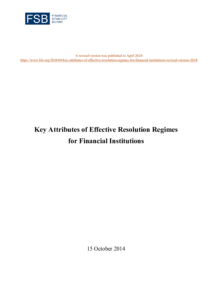This annual report on the implementation of resolution reforms takes stock of progress made by FSB members in implementing resolution reforms and enhancing resolvability across the banking, financial market infrastructure, and insurance sectors.
-
Central Counterparties (CCPs) – Progress in implementing the G20 reforms agreed after the 2008-09 financial crisis has promoted the use of CCPs but has also increased their systemic importance. While various efforts have been made to enhance the resilience and resolvability of CCPs, the report notes that further work is still needed on CCP resolution and resolvability, including the adequacy of resources for CCP resolution.
-
Insurers –There is still work to be done to make resolution plans for insurers fully operational. The report highlights the importance of ensuring the continued effective application of the Key Attributes, should the identification of Global Systemically Important Insurers (G-SIIs) be discontinued and replaced by the IAIS Holistic Framework for the assessment and mitigation of systemic risk in the global insurance sector.
-
Banks – Global systemically important banks (G-SIB) resolution planning is maturing and the focus is shifting increasingly to fine-tuning and testing resolution preparedness. G-SIBs’ progress towards resolvability has been incremental since last year, reflecting the level of advancement of resolution policy implementation in many jurisdictions. Funding in resolution remains an area of focus for both firms and authorities. The FSB has also focused on assisting home and host authorities in having a clear understanding of approaches to unallocated TLAC. And work has been conducted on issues relating to resolution planning of banks other than G-SIBs that could be systemic in failure.
The report sets out the FSB’s priorities in the resolution area going forward. In 2023, these will include continued focus on completing the resolution frameworks for CCPs and insurers, and consolidating the FSB’s work on bank resolution preparedness.
